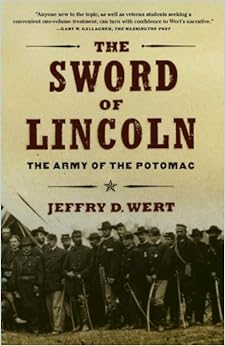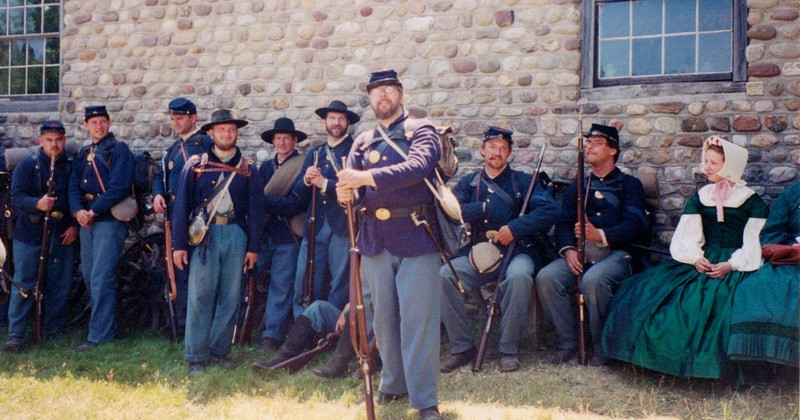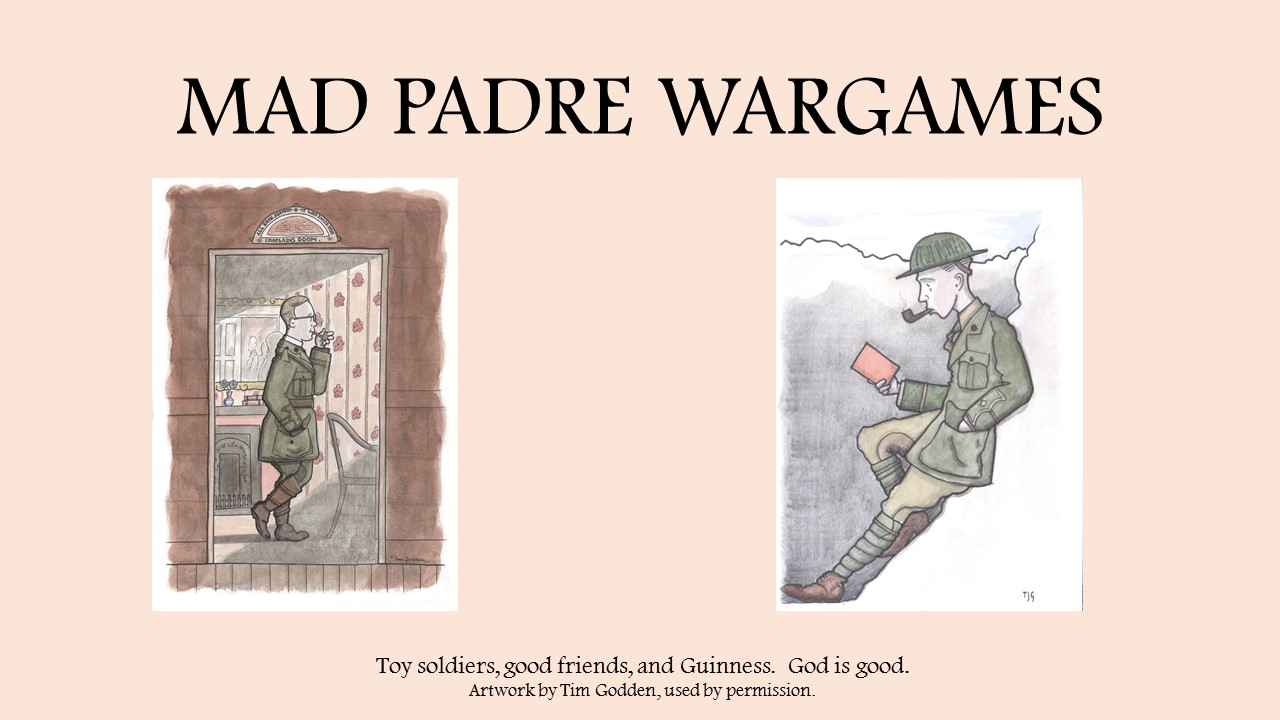
One of the pleasures of a university library is the odd book that jumps off the shelves. My campus, Wilfrid Laurier, doesn’t have a great American Civil War collection, but I was pleased to find a book I didn’t know, Jeffry Wert’s study of the Union’s most well known army, The Sword of Lincoln: The Army of the Potomac. It’s always tempting to think about the great armies of history as having their own particular characters, to judge them as to their resilience, their endurance, and so forth. Of course these debates can have an artificial character. For one thing, armies change over time. Napoleon’s Grand Army of 1805 was not the same army that went to Russia in 1812 or that fought at Waterloo. Likewise, the Whermacht of 1945 was a shadow of its former self And then there is leadership. Was the Army of Northern Virginia a great army because of its troops, or because of Lee and his lieutenants, or because for most of its career it went up against the Union’s second stringers?
Jeffry Wert, a Civil War historian of note, makes a good case that the Army of the Potomac had a distinct character that was found in its soldiers, who did not get the general they deserved until Grant, even if Grant too had his bad days (such as Cold Harbor). I quite enjoyed this book, and thought his last paragraphs worth quoting.
The Army of Northern Virginia’s battlefield prowess and victories came against an opponent that at its core - its rank and file - was a great army. No other Union army opposed such a formidable foe, fought more battles incurred more casualties, and withstood more command turmoil than the Army of the Potomac. At times, its soldiers despaired of the outcome and cursed their leaders. But they remained devoted to the cause, despite the fearful losses and inept generalship. Resiliency became one of their defining characteristics. They wanted a fair fight with their enemy, convinced that they could whip them every time on such a field.
If the greatness of men can be found in specific places, there was no better place to measure the rank and file of the Army of the Potomac than before the stone wall at Fredericksburg. It was an insane place, but time and again men went forth - because of orders, because of duty, because of something beyond themselves. It was a place of greatness.
One of their own gave them a fitting epitaph. Wriitng in October 1863, Sergeant Charles Bowen of the 12th United States Infantry told his wife: “If is actually wonderful how the Army of the Potomac stand the deprivations, trials, & reverses that have been heaped on them without stint or mercy to meet the foe with undaunted spirits. I do not believe there ever was an army in any country that would endure the same treatment this army has & yet be ready to fight as good a battle, & perhaps a better one than they could when they first came out. Although we have been deprived of the privilege of winning any lasting victories, it has not been our fault, as history in future days will show. I look forward to the time when a man can say with pride, “I belonged to the Army of the Potomac. We look to history to give us our just due & to place all the blame where it belongs."
Just as I finished this book, I came found this photo, which was taken around 2000. I’m not sure that tubby fellow in the foreground, when I was younger and heavier, would have looked typical of a private in the Army of the Potomac, but some of the chaps in the back did a good job of representing the genuine article.


That looks like a good book. Good history book about war are so difficult to find.
ReplyDeleteI'm in the middle of watching Ken Burns' "Civil War" documentary series. This book sounds like it'd offer more depth to what he offers.
ReplyDeleteThanks!
Ken Burn's series was absolutely groundbreaking when it came out in the 1990s. It's what got me into the funny blue suit in this photo. I think it inspired a long renaissance of ACW historiography.
DeleteThat sounds like a very summation of the Army of the Potomac. I do not believe, though, that its leaders were all that second rate neither. Poor old Ambrose Burnside was astonishingly unlucky (though to be sure he often made his own unluck). His plan, that led to the infamous Mud March, and that formed the basis of Hooker's Chancellorsville operation, was in my view a well conceived notion. Napoleon would have recognised it at once as a 'manoeuvre sur les derrieres' writ small. Carried thtough with resolution, it might well have succeeded.
ReplyDeleteRobert Lee himself always said after the war that Geo McClellan was the best general he faced, this whilst fully recognising that general's over-caution. When you think about it, apart from a decisive success over a wing of McClellan's army at Gaines's Mill, he never quite managed tactically to get the better of him in battle. True, Lee got the better of McClellan stratigically. The opposite was ture in the case of U.S. Grant. Lee handed Grant several bloody noses, but without the numbers to push home these successes, could never establish the strategic supremacy.
If we may indulge in speculation, I believe that if Grant had commanded the AotP in 1861-2, he would have done better than McClellan; and then if McClellan had assumed its command in 1864, he would have done better than Grant.
Hello Ion:
ReplyDeleteI am sorry I am only now replying to your very thoughtful comment. I agree that it would be unfair to call all of the AoP's commanders prior to Grant as "second rate". However, as Wert notes in his book, there isa common theme in the diaries and letters of its soldiers that their leaders were consistently "outgeneraled", as one put it, by their foes. Certainly they had some good opportunities. Hooker's plan for the Chancellorsville campaign did work - he effectively outflanked Lee and had a significant advantage. Had he not been knocked out of the fight at a key moment, Hooker might have recovered from the ambush of XI Corps and regained the initiative, but he didn't.
McClellan - the more I read about him, the more I think he was an awful battlefield commander. Wert mentions several times that during the Seven Days which decided the Peninsula Campaign, McClellan returned to his quarters on a ship at the end of the day on several occasions, thus limiting his ability to control the fight. Same at Antietam. I've been at the site of his HQ and it is on the far side of Antietam Creek, far removed from the battle - by tethering himself to that location, he forfeited his chance to control the battle closely and never realized his advantage in numbers.
Grant's handling of fighting in the Wilderness, May 5-6, was not much better. Due to his odd command relationship with Meade he let the battle unfold piecemeal, sustaining many needless casualties, but he turned south instead of back north after those two days, and with that move his soldiers knew that he meant business. You have to respect the troops of that army, who lost countless friends in the Overland Campaign of 1864 and still voted overwhelmingly for Lincoln over their former CO McClellan, because they wanted to finish the war as winners. That takes some sand.